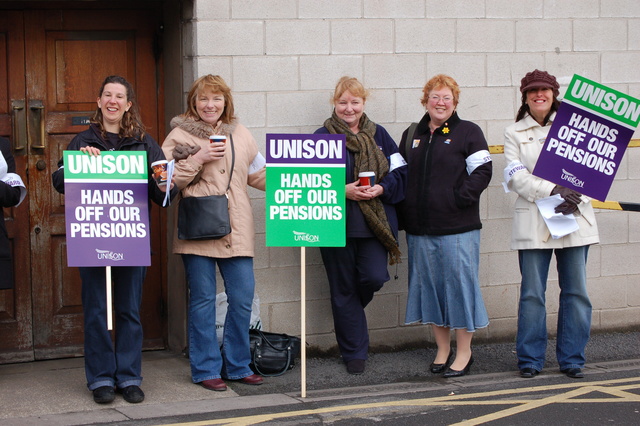31.03.2006 20:32
Who is involved?
Members of the local government pension scheme (LGPS), including:
# Teaching assistants
# Home helps
# Police community support officers
# School meals workers
# Meat hygiene inspectors
# Environmental health officers
# Emergency services control room staff
# Refuse collectors
# Key administrators
We keep your water supplies clean, your colleges and universities working and your local transport systems running.
Without us, many key public services would grind to a halt.
Three quarters of us are women, many in low-paid, part-time jobs.
Why is this action taking place?
The employers want to change the rules of the local government pension scheme we signed up for, forcing us to work longer or get a worse pension. How is that fair?
In our jobs we find ourselves working alongside colleagues who have their pensions protected, for example teaching assistants working with teachers, emergency services control room staff working alongside NHS paramedics and scenes-of-crime officers working with police officers. Again, how is that fair?
Have there been any negotiations with the government?
Strike action is always our last resort, but the government and employers have refused to listen to our concerns. That is why we are taking action to defend our pensions.
Don't LGPS members retire in luxury on "fat cat" pensions?
No! We have paid 6% of our earnings into our pension scheme all our working lives. Women, who make up three quarters of the pension scheme members, get an average pension of just £31 a week.
Unlike many of our employers, we've never taken a pensions contributions holiday - they have.
For many, pensions fall below means-tested benefit levels.
Life expectancy is going up. Why should members of the LGPS be entitled to retire at 60?
Life expectancy has increased, but not for manual workers. And some jobs we do will be physically impossible over 60. What are we to do?
Won't this cost the taxpayer a fortune?
Actually, it will save the taxpayer around £2 billion.
Approximately 3-4% of council tax goes on the LGPS, but if it didn't fund our members' pensions, we would all have to pay higher taxes for benefits and state pensions for them.
The proposed cuts to the LGPS will cost the government £2 billion in higher state benefits and state pensions. And at the end of the day, that cost would be passed onto the taxpayer.
And unlike every other public sector pension scheme, the LGPS saves you and the government money. Contributions are invested and last year 28% of the value of the scheme came from investments.
If you are not a member of the LGPS or working in the public sector, you might think this has nothing to do with you. Nothing could be further from the truth. 2.5 million people are in the LGPS, or already getting a pension from it. That means someone you know!
Many people are not in the local government pension scheme. Why should they care?
Even if you're not in the LGPS, but have been balloted, we would ask you to join your colleagues on 28 March.
We want to negotiate a scheme for the future which all our members can afford. So if you are not an LGPS member because your pay or hours are too low, we want to ensure you will be part of the scheme and are treated equally.
MEMBERS: What happens to your pension if there is strike action?
One question branch officers are often asked when there's any suggestion of a strike or other industrial action is, "What would happen to my pension?" It is also an issue that management raise, in an attempt to stop people planning to take action.
For every whole day a member is out on strike s/he will lose one day's pensionable service. The lost days would not count in any way for pension purposes. Therefore a member would effectively loose 1/365th of an 80th for each and every full strike day.
It is possible to buy back the service lost, at your own cost, but the rules as set out in the regulations are quite tight. Contact your branch officer or LGPS administrator for more information and advice. You have 30 days from the date you return to work (longer if the employer allows) to make up your mind.
stinky


